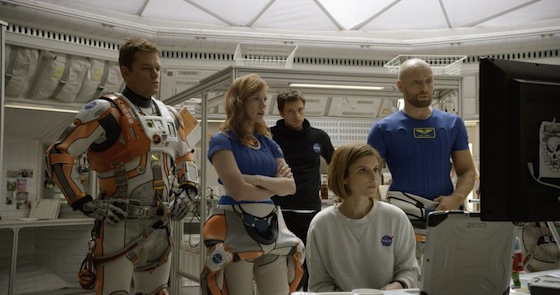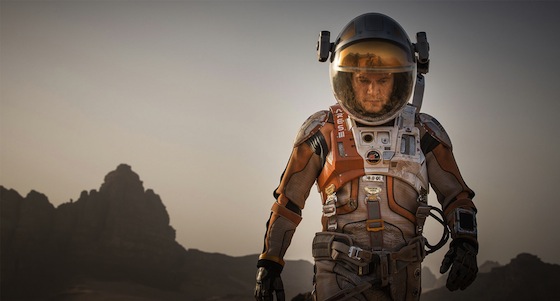There is a family of films that has been released over the past few years in quick succession, one after another. Gravity, the eldest sibling, was the stoic one, giving short, poetic soundbites before walking off in a shroud of mystery for us to feel the poignancy of it all. Interstellar, the middle child, burst at the seams with ambition, at times wowing with its visuals but ultimately leaving us to sort out the mess on our own (to often underwhelming results). Now we have The Martian, the youngest, and it wants to make sure we enjoy ourselves.
The Martian, directed by Ridley Scott, sets its tone perfectly in the first twenty minutes. After being knocked away from a piece of equipment destroyed in a Martian storm, Matt Damon’s Mark Watney’s first task is to make his way back to the artificial habitat and remove the piece of wire stabbed into his abdomen. The scene is executed in extreme detail, bloody and fleshy as Damon attempts to staple the open hole in his side. It’s gruesome, fascinating. He follows this by recording his first log, and after establishing he has been left on Mars alive, he shrugs it off with a “surprise!”
There’s a sense of humor and nonchalance to The Martian that makes it feel like a breath of fresh air after the self-aggrandizing of other recent science fiction epics grasping for “realism”. It plays almost like a good heist movie; snappy dialogue and extremely smart characters solving problems. He has to stay alive long enough to be rescued as well as find a way to let people know he is, indeed, alive. They have to find a way to rescue him as quickly and efficiently as possible. Along the way there are many problems that get in the way, and most of the film is taken up by the characters solving these problems. There are no prolonged sequences of Matt Damon, in tears and scared, calling to the heavens he will see his family again. Instead, Mark Watney faces his problems with a grin and an optimism that is infectious.
 This optimism takes form, chiefly, in a sense of humor. There were moments during the film where the audience I was with was laughing so hard we would miss lines of dialogue. They weren’t gags as much as just moments of clever dialogue and extreme charm (chiefly from Damon), which makes sense seeing Screenwriter Drew Goddard’s rap sheet includes work on Buffy the Vampire Slayer as well as Marvel’s Daredevil. It’s funny without trying to be, and that humor helps turn the film’s large stretches of technical jargon and exposition into genuinely enjoyable moments of levity and intrigue. Let’s face it, it’s Matt Damon, we know he’ll get home. How he’ll get home is the question, and the film makes the how more entertaining than almost any stretch of action this year.
This optimism takes form, chiefly, in a sense of humor. There were moments during the film where the audience I was with was laughing so hard we would miss lines of dialogue. They weren’t gags as much as just moments of clever dialogue and extreme charm (chiefly from Damon), which makes sense seeing Screenwriter Drew Goddard’s rap sheet includes work on Buffy the Vampire Slayer as well as Marvel’s Daredevil. It’s funny without trying to be, and that humor helps turn the film’s large stretches of technical jargon and exposition into genuinely enjoyable moments of levity and intrigue. Let’s face it, it’s Matt Damon, we know he’ll get home. How he’ll get home is the question, and the film makes the how more entertaining than almost any stretch of action this year.
The downside of this fun and relaxed mode of filmmaking, though, is that the film just doesn’t impress as it should. Space feels less momentous than it did in Interstellar. There’s never a moment where you’re just blown away by how well Ridley Scott has captured the martian landscape or interplanetary travel. We’ve been seeing it a lot, and after how massive space has seemed lately The Martian feels somehow petite, minor. Intellectually, too, it aspires to much less than the other two main entries of recent memory. This is not the fault of the film, merely an unfortunate result of the current state of major studio science fiction. However it is hard for me to be as enthusiastic about it as I was after my first go-through with Interstellar. It’s not an event anymore, just another piece of well-done science realism.
 That being said, it will not surprise me if The Martian proves to have the longest shelf-life of any of these works. Gravity is too simple in structure to work on a small screen, and has lost the magic it had in 3D with full speakers. Interstellar still amazes technically but its messy story merely becomes more tangled and less organized with each viewing. The Martian’s smart script and sharp construction will make it a joy to watch again, though perhaps not for intellectual reasons. It’s genuinely fun without dumbing itself down, which is sadly rare with today’s blockbusters. Perhaps it’s not an important moment in film history, but I eagerly suggest fans of science fiction to go see this film.
That being said, it will not surprise me if The Martian proves to have the longest shelf-life of any of these works. Gravity is too simple in structure to work on a small screen, and has lost the magic it had in 3D with full speakers. Interstellar still amazes technically but its messy story merely becomes more tangled and less organized with each viewing. The Martian’s smart script and sharp construction will make it a joy to watch again, though perhaps not for intellectual reasons. It’s genuinely fun without dumbing itself down, which is sadly rare with today’s blockbusters. Perhaps it’s not an important moment in film history, but I eagerly suggest fans of science fiction to go see this film.






Comments on this entry are closed.